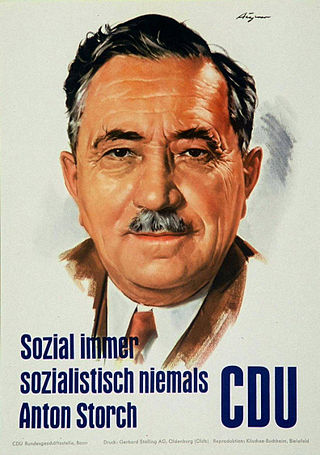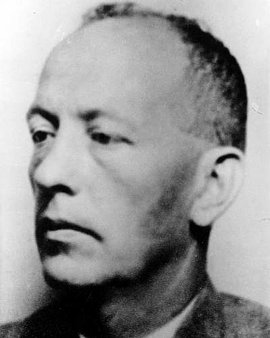
Karl Arnold was a German politician. He was Minister President of North Rhine-Westphalia from 1947 to 1956.

Plauen is, with a population of around 65,000, the fifth-largest city of Saxony, Germany after Leipzig, Dresden, Chemnitz and Zwickau, the second-largest city of the Vogtland after Gera, as well as the largest city in the Saxon Vogtland. The city lies on the river White Elster, in the Central Vogtlandian Hill Country. Plauen is the southwesternmost city of a string of cities sitting in the densely populated foreland of the Elster and Ore Mountains, stretching from Plauen in the southwest via Zwickau, Chemnitz and Freiberg to Dresden in the northeast. It is the capital of the Vogtland District. Plauen borders Thuringia to the north, and it is also situated near the Saxon border with Bavaria (Franconia) and the Czech Republic (Bohemia).

Jakob Kaiser was a German politician and resistance leader during World War II.
Franz Böhm was a German politician, lawyer, and economist.
The Freiburg school is a school of economic thought founded in the 1930s at the University of Freiburg.

Andreas Hermes was a German agricultural scientist and politician. In the Weimar Republic, he was a member of several governments, serving as minister of food/nutrition and minister of finance for the Catholic Zentrum. During the rule of the Nazi Party, Hermes was part of the right-wing resistance, for which he was imprisoned and sentenced to death, but never executed thanks to the intervention of his wife. After World War II, he co-founded the Christian Democratic Union.

Hermann Ehlers was a German politician. He was the second president of the Bundestag from 19 October 1950 to 29 October 1954.
Joseph-Ernst Graf Fugger von Glött , since 1940: Fürst Fugger von Glött was a German politician and representative of the Christian Social Union of Bavaria. He was a member of the Bundestag of Germany between 1949 and 1953. From 1954 to 1962 he was a member of the Landtag of Bavaria. He is a member of the famed Fugger family, the preeminent bankers of the renaissance era.

Robert Lehr was a German politician. He served as Federal Minister of the Interior from 1950 to 1953 under chancellor Konrad Adenauer.

The Buchenwald Resistance was a resistance group of prisoners at Buchenwald concentration camp. It involved Communists, Social Democrats, and people affiliated with other political parties, unaffiliated people, Christians, Jews, and Muslims. Because Buchenwald prisoners came from a number of countries, the Resistance was also international. Members tried to sabotage Nazi efforts where they could, worked to save the lives of child inmates, and in the last days of the camp, with many Nazis fleeing the approaching allied troops, tried to gain control of the camp itself. After liberation, the prisoners documented their experiences on paper and formed an international committee to look after the welfare of survivors.

Robert Siewert was a German politician who fought in the German Resistance against National Socialism. He was a survivor of Buchenwald concentration camp, where he helped save the life of Stefan Jerzy Zweig, among others.

Eugen Kogon was a German historian and Nazi concentration camp survivor. A well-known Christian opponent of the Nazi Party, Kogon was arrested more than once and spent six years at Buchenwald concentration camp. Known in Germany as a journalist, sociologist, political scientist, author, and politician, he went on to be considered one of the "intellectual fathers" of both West Germany and European integration. His 1946 book The Theory and Practice of Hell still stands as a basic reference on Nazi crimes.

Friedrich Carl Nicolaus Constantin von Dietze was an agronomist, lawyer, economist, and theologian. He was a member of both the Confessing Church and the "Freiburg Circle" during the Nazi era.

Alois Hundhammer was one of the most prominent politicians in Bavaria after World War II.

Otto Lenz was a German politician (CDU), serving from 1951 to 1953 as Head of the Chancellery, and from 1953 until his death as a member of the German Bundestag. He was also a signatory of the founding declaration of the CDU.

Anton Storch was a German trade unionist, politician, a member of the Christian Democratic Union (CDU) and the minister of labor from 1949 to 1957.
The Association of the German Farmers Associations (VdB) existed from 1900 to 1934 and was an amalgamation of Christian farmers’ organizations. From 1900 to 1916 it was called "Association of Christian German Farmers Associations" and from 1931 to 1934 it used the name "Association of German Christian Farmers Associations".

The Gau Saxony was an administrative division of Nazi Germany from 1933 to 1945 in the German state of Saxony. Before that, from 1925 to 1933, it was the regional subdivision of the Nazi Party in that area.

Margarete Gröwel was a German teacher who became a politician. Later, in 1953, she became the first woman to serve in the German consular service in Houston.

Franz Leuninger was a German trade unionist, politician and resistant against the Nazis' rise to power and regime. Working as a bricklayer after school, he became a member of the trade union for construction workers early on, serving as its regional leader in Silesia in the 1920s. He was a member of the city council of Breslau for the Zentrumspartei from 1930, and ran for the German Reichstag in 1933, as a strong opponent of the Nazi party.
















